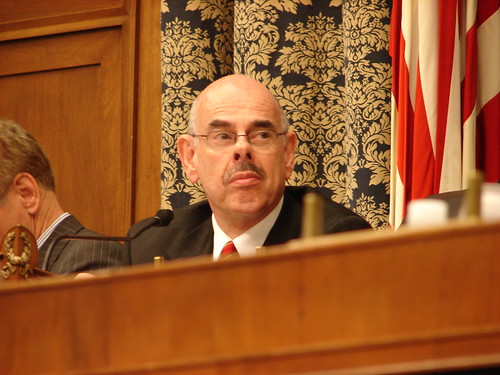The House Energy & Commerce Committee (E&C) — chaired by Representative Henry Waxman (D- Hollywood) — continues to work overtime to make energy harder to produce, more expensive, more imported and more rare. Using the tragic Gulf spill as justification, the committee unanimously passed the “Blowout Prevention Act of 2010” on the same day BP finally achieved some success in controlling its out-of-control Macondo well. With this bill, Chairman Waxman is leaping before he looks, with serious consequences for US energy and national security, as well as for the jobs of not just the hundreds of thousands who work in the offshore energy industry, but their counterparts on land, as well. He is leaping off a cliff while holding onto America’s arm.
Rather than waiting to find out what went wrong and working to fix it, E&C passed an expansive new bill that micromanages federal offshore oil rig technical requirements, in a “shoot first and then ask questions” approach that helps explain congress’s growing dislike by the public.
Although it is common today for congress to leap before they look in an attempt to be seen as doing something, anything, about the issue du jour, it was not always so. For example, when the Space Shuttle Challenger explosion in 1986 prompted the establishment of a blue ribbon presidential commission to investigate, they discovered the problem and said this about the legislative branch of government in their report:
“Congress recognized the desirability, in the first instance, of having a single investigation of this national tragedy. It very responsibly agreed to await the Commission’s findings before deciding what further action might be necessary to carry out its responsibilities.
In today’s case of the gulf spill, the president has appointed a panel of apparently like-minded individuals so controversial that committees in both the House and Senate have passed legislation establishing an independent panel, including in an amendment to Mr. Waxman’s bill. And with the passage of this bill, congress is clearly not “responsibly await(ing) the Commission’s findings.”
But in what is the most stunning power grab of all, the bill for the first time ever requires federal permission for every onshore oil or gas well drilled in the United States, including those on state and private lands. If you’re wondering why a bill prompted by an offshore oil spill should have any effect on wells on land, you’re not alone. Washington politicians apparently think they can do everything better than states and local governments. And they also appear to never want to “let a crisis go to waste.”
Ever since Colonel Drake drilled the first well in 1859, permitting wells on private and state lands has been the responsibility of the States. Certain federal laws, such as the Clean Air Act and Clean Water Act, apply to the drilling of a well, but not the actual practice of drilling the well. The Waxman bill makes state regulation of wells subject to federal approval, and in the absence of such approval, requires operators to obtain federal permits. In other words, drilling an oil or gas well under this bill has become federalized.
Currently, there are about 1 million producing oil and gas wells spread throughout the United States, the vast majority on state and private lands. States have adjusted their permitting to meet the conditions on the ground and have a stellar track record of working to enhance and improve operational safety while minimizing environmental impacts. After all, a state’s residents are the ones who live with the consequences of bad decisions, and are best prepared to balance the costs and benefits of a particular regulation.
But under this bill Texas – with almost 250,000 operating wells and California – with over 50,000 wells, are deemed incapable of what they’ve been doing for a century unless they seek and are awarded federal approval. And while “marginal wells” (those producing 10 barrels or less per day) are exempted from the bill, it is silent on how someone can validate that a well he intends to drill is marginal before he drills it.
This is the kind of nonsense that passes for legislation today. The only thing that is certain about this bill is that it will make it harder to produce domestic energy, create uncertainty for domestic producers and all the jobs they support, and lead to making the US less competitive in energy production and more reliant on foreign sources of energy made competitive by the visible hand of government malfeasance.
If it is truly Washington’s wish to “get us off of oil” they should have the discussion out in the open, rather than hiding it behind the public’s rational concern about the spill in the Gulf. Leadership in Washington also requires them to review whether their own actions are making our energy outlook worse, rather than better. But don’t expect to see those types of hearings from a group that leaps before it looks.
